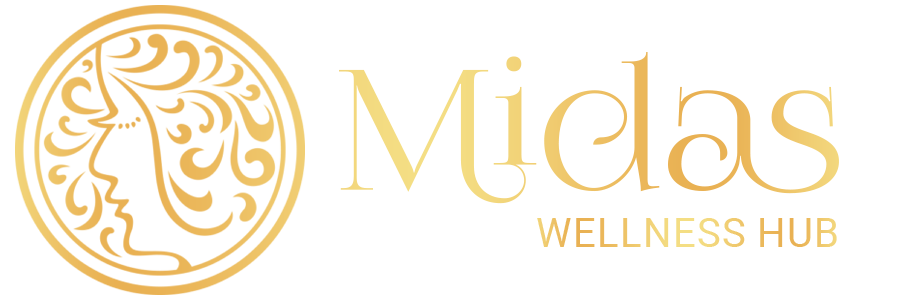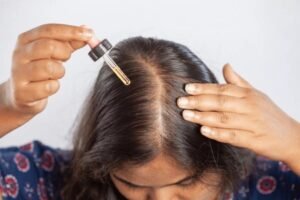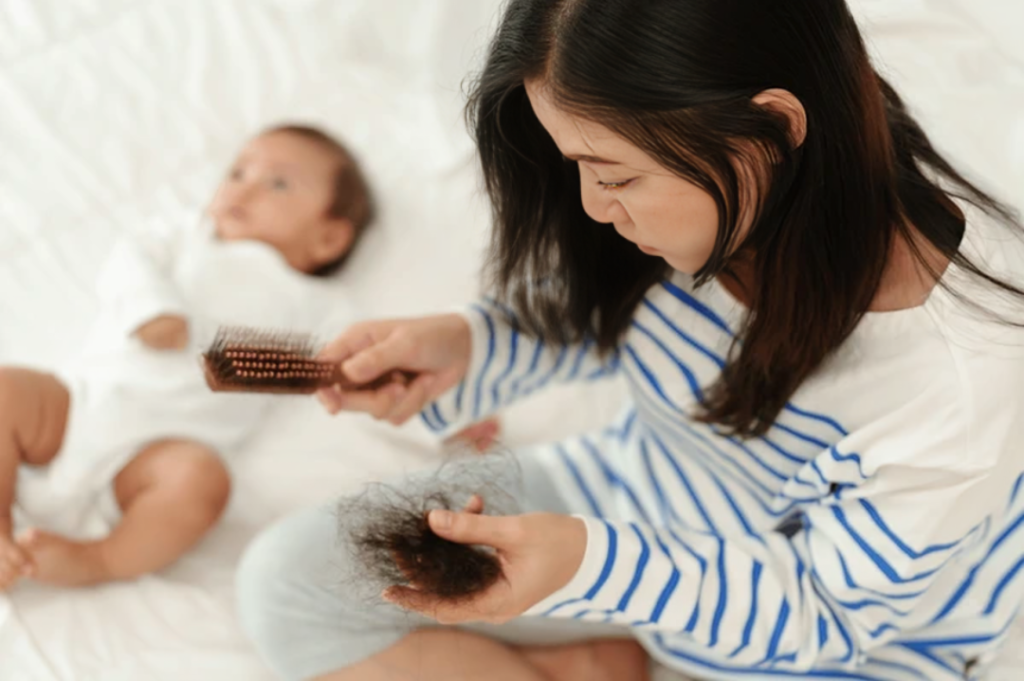
Is Minoxidil Really Safe for Hair Loss? The Truth You Need to Know
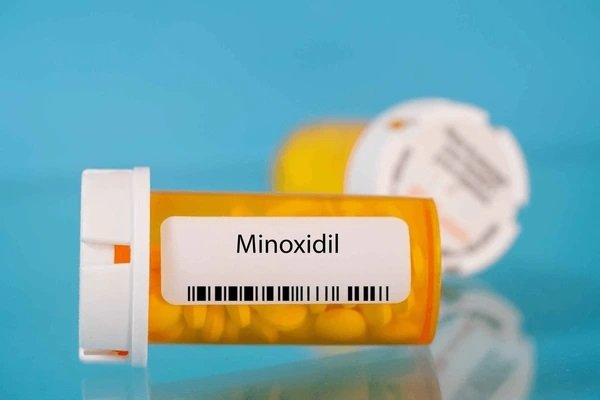
Is Minoxidil Really Safe for Hair Loss? The Truth You Need to Know
If you’re struggling with hair thinning or hair loss, you’ve probably come across Minoxidil—a common treatment recommended by many dermatologists. Marketed as a solution for androgenetic alopecia (male and female pattern baldness), Minoxidil is often seen as a quick fix for hair regrowth. But is it really the best option for your hair health?
While Minoxidil does stimulate hair growth for some people, it comes with serious side effects, dependency issues, and long-term risks. In this blog, we’ll discuss why Minoxidil is not as safe as it seems, its harmful effects, and better alternatives for hair regrowth that actually work without damaging your scalp.
What is Minoxidil? How Does It Work?
Minoxidil is an FDA-approved topical medication that works by increasing blood flow to hair follicles, forcing them into the growth phase. Originally used to treat high blood pressure, researchers discovered that one of its side effects was increased hair growth, leading to its use as a hair loss treatment.
It is commonly available under brand names like Rogaine, Tugain, Mintop, and Kirkland in concentrations of 2%, 5%, and 10%.
But despite its popularity, Minoxidil is not a permanent solution and comes with several drawbacks that many people are unaware of.
Why Minoxidil Is Not a Good Option for Hair Loss
1. Temporary Results: Hair Falls Out When You Stop Using It
Minoxidil does not treat the root cause of hair loss—it only stimulates existing hair follicles. Once you stop applying it, the new hair sheds within 3-6 months, leaving you back at square one. This dependency makes it a lifelong commitment.
2. Causes Excessive Hair Shedding (Minoxidil Shedding Phase)
When you start using Minoxidil, you may notice increased hair fall within the first few weeks. This is because it pushes out weaker hair strands before regrowing new ones. However, for many people, the hair loss doesn’t stop, leading to thinner hair over time.
3. Common Side Effects of Minoxidil
✔ Scalp Irritation – Redness, itching, and burning sensation.
✔ Dandruff & Dryness – Alcohol-based formulas dry out the scalp, leading to flakes.
✔ Increased Facial Hair Growth – Women using Minoxidil may notice unwanted hair on the face.
✔ Heart Palpitations & Dizziness – Since Minoxidil was originally a blood pressure medication, it can affect heart rate.
4. Long-Term Use Can Damage the Scalp
Continuous use of Minoxidil can cause scalp sensitivity, excessive dryness, and inflammation, leading to weaker hair follicles in the long run. Many users report thinning hair after prolonged use instead of permanent regrowth.
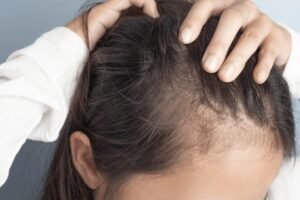
5. Not Effective for All Types of Hair Loss
Minoxidil mainly works for genetic hair loss (androgenetic alopecia). It is not effective for hair loss caused by:
❌ Nutritional deficiencies (low iron, vitamin D, biotin deficiency)
❌ Stress-related hair loss (telogen effluvium)
❌ Hormonal imbalances (PCOS, thyroid issues)
❌ Scalp infections or inflammation (seborrheic dermatitis, dandruff)
Safer & More Effective Alternatives to Minoxidil
Instead of using Minoxidil, consider natural and advanced treatments that actually promote healthy hair growth without side effects.
1. PRP (Platelet-Rich Plasma) Therapy
✔ Stimulates hair follicles using growth factors from your own blood.
✔ Helps in thicker, stronger, and long-lasting hair regrowth.
✔ No chemicals, no side effects, and clinically proven for hair restoration.
2. Exosome Hair Therapy
✔ Advanced stem cell technology for hair regrowth.
✔ Faster results than PRP and promotes healthy scalp rejuvenation.
✔ Safe and effective for both male and female hair loss.
3. Low-Level Laser Therapy (LLLT)
✔ Stimulates blood circulation in the scalp, improving hair density.
✔ FDA-approved and completely non-invasive.
4. Microneedling for Hair Growth
✔ Uses tiny needles to activate dormant hair follicles.
✔ Increases collagen production and improves scalp health.
5. Natural Hair Treatments
✔ Herbal oils like onion oil, rosemary oil, and bhringraj oil improve scalp health.
✔ Scalp massages increase blood circulation naturally.
✔ Biotin, iron, and vitamin D supplements help strengthen hair from the root.
Best Hair Fall Treatments at Midas Wellness Hub
At Midas Wellness Hub, we offer safe and long-lasting solutions for hair regrowth without harmful chemicals like Minoxidil:
✔ PRP Hair Therapy – Strengthens hair follicles and boosts natural regrowth.
✔ Exosome Therapy – Cutting-edge treatment for advanced hair loss.
✔ Hair Mesotherapy – A non-surgical treatment to nourish and rejuvenate scalp health.
✔ Scalp Detox & Hydration Therapy – Treats dandruff, inflammation, and scalp dryness naturally.
✔ Customized Diet & Supplement Plan – Personalized nutrition plans to prevent hair fall.

If you are looking for permanent and healthy hair regrowth, book a consultation at Midas Wellness Hub today!
Conclusion
While Minoxidil is widely recommended, it is not the best long-term solution for hair regrowth due to its temporary effects, side effects, and dependency. Instead of relying on chemical-based treatments, opt for safer and more effective alternatives like PRP therapy, exosome hair treatment, laser therapy, and natural hair restoration methods.
At Midas Wellness Hub, we provide customized, doctor-approved solutions for hair fall, hair thinning, and scalp issues—without the risks of Minoxidil.
👉 Book a consultation today for a safer, long-term hair regrowth solution!
FAQs
No, long-term use can cause scalp irritation, dryness, and dependency, making hair loss worse if stopped.
Your hair will start shedding again, and any hair growth achieved with Minoxidil will be lost.
No, Minoxidil only works as long as you use it. It does not address the root cause of hair loss.
PRP therapy, Exosome therapy, laser hair treatments, and natural hair oils are better options with zero side effects.
By following a healthy diet, proper scalp care, stress management, and advanced hair treatments like PRP or mesotherapy, you can effectively stop hair loss.
